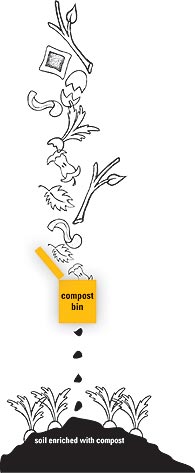Home Composting
The resources in this page are no longer being updated. Please contact RDN Solid Waste Services for updated information.Overview
Sustain the land, save landfill spaceOver half the waste generated by households in our region is organic material such as yard and garden waste, food scraps and soiled paper products. Composting is an environmentally sound way to turn this waste into a useful resource.
The Regional District of Nanaimo has identified composting as a key initiative in achieving the region's long term Zero Waste goal to eliminate garbage, reduce greenhouse gases and create a more sustainable region.
Promotion and educational programs have encouraged backyard composting in the region. A regional pilot project has shown that by adding food waste to the collection of other curbside recyclables, households can divert up to 70% from the landfill. Curbside food waste collection will complement composting at home by accepting materials such as meat and food-soiled paper products that are unsuitable for backyard or worm composting.
What is composting?

Composting is natural biological process that turns organic waste from your kitchen and garden into a soil-enriching humus.
Home composting isn't complicated and most methods don't require expert knowledge or special equipment. Once you've decided on the best approach for your circumstances, it's simply a matter of taking the time to collect your organic waste and start an active compost pile. Once you get going, nature will take its course with a little help along the way.
How does composting work?
 Composting breaks down organic wastes through a combination of biological and organic processes. Biological agents such as worms, insects, fungi, bacteria and other microorganisms eat and digest the materials creating a nutrient-rich humus.
Composting breaks down organic wastes through a combination of biological and organic processes. Biological agents such as worms, insects, fungi, bacteria and other microorganisms eat and digest the materials creating a nutrient-rich humus.
What are the benefits?
- Turns yard and garden waste and fruit and vegetable scraps into a valuable soil conditioner.
- Reduces the amount of garbage that you take to the curb and lessens yard and garden waste requiring disposal.
- Extends the life of the region's only landfill.
What can I compost?
Materials suitable for composting depend on the method you choose but generally include vegetable and fruit scraps, grass clippings, leaves, coffee grounds, tea and tea bags, egg shells, sawdust and wood ash. Bones, meat or fish, cooking oils, dairy products, grains or cereal, diseased plants or leaves and pet feces should not be composted as they will attract rodents and wildlife or contaminate your compost. Download the Composting or Worm Composting brochure from this site for more information.
What composting method is best for me?
Selecting the right method or combination of composting methods is important. Some methods don't even require a bin or special tools; others use the design of the composter to speed up the process.
The best approach is to select a system that suits your budget, the space you have available, the type and volume of waste you want to compost and your level of technical knowledge, time and enthusiasm. Here are some considerations:
- What materials do you want to compost? Food scraps, yard and garden waste, grass clippings?
- How much compostable waste do you generate? Kitchen scraps from a two-person household or a large family, or materials from a large garden and lawn?
- How much space is available? If you live in an apartment or condominium, worm composting may be your only option. If you have a small yard, a compact plastic backyard composter could be the best solution.
- What's your level of enthusiasm? Do you want lots of compost for your garden or simply want to reduce and recycle your organic waste?



